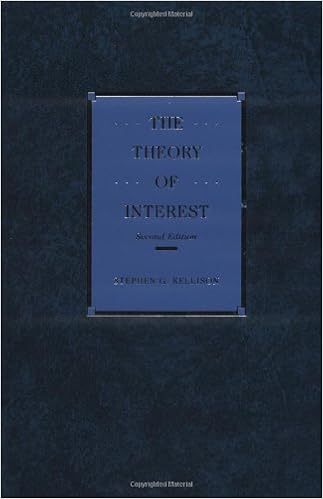
The Theory Of Interest, 2nd Edition Download Free (EPUB, PDF)

The book is a thorough treatment of the mathematical theory and practical applications of compound interest, or mathematics of finance.

Hardcover: 448 pages
Publisher: Richard D. Irwin; 2nd edition (May 1, 1991)
Language: English
ISBN-10: 0256091501
ISBN-13: 978-0256091502
Product Dimensions: 6 x 0.9 x 9 inches
Shipping Weight: 1.6 pounds
Average Customer Review: 3.6 out of 5 stars See all reviews (31 customer reviews)
Best Sellers Rank: #840,685 in Books (See Top 100 in Books) #60 in Books > Business & Money > Economics > Interest #161 in Books > Business & Money > Insurance > Business #4694 in Books > Business & Money > Finance

In order to save the reader some time I have condensed the information contained in the twenty previous reviews to the bare essentials. For those of you who are taking the SOA/CAS Exam F/2, there are some things you should be aware of before you dedicate yourself to studying from this book.1. The book is poorly written. Almost everyone, including me, agrees. The author does not have a way with words, he does not know how to motivate the material and he often chooses the most confusing and roundabout way of explaining the concepts (if he explains them at all). Furthermore, the notation can be quite confusing. He is not consistent with his variables.2. The book focuses on theory. Expect to spend your time following proofs and derivations of formulas. The problem sets in the book focus on proofs and derivations. Have a firm grasp on Calc 1, Calc 2 and all the algebra that is entialed because Kellison will not spend the time to spell out his proofs and derivations step by step.3. You need a supplement for working example problems. There are not enough computational problems in this book. Get a good manual that will prepare you specifically for the exams you are taking. Manuals will give you pointers about managing your time and can help you avoid common traps and pitfalls that arise during computations. I recommend getting an Atex or ASM manual. For instance, Harold Cherry's ASM Manual covers all of the topics found in Kellison, at greater depth, in the same order, and in plain english.4. Many people have passed the exams using only manuals. Other's have passed using manuals and other texts such as "Schaum's Outline of Mathematics for Finance" or "Mathematics of Finance" by Cissell.
I'm a third-year undergraduate who has loved and excelled at mathematics my whole life. We're talking mostly A's and some B's all through an honors high school program and through advanced multivariable calculus in college.I've decided to pursue actuarial work, and this fall I enrolled in a course called "Theory Of Interest," which is the introductory course for this subject at my university. The sole textbook for this course was (surprise) Kellison's "Theory Of Interest."For starters, let's make perfectly clear that the pure math involved here is easy as pie. Anyone at this level should be able to do it in their sleep before they've even cracked open the book; arithmetic, algebra, and a smidge of some very basic and easy calculus. So this subject is all about learning the definitions and procedures and applying them to problem solving.That said, I have never, ever, EVER had anything close to this much trouble with a mathematics course in my life, simply because I could not understand this textbook. As a highly detailed and analytical person, I rely heavily on the textbook to learn any subject. I expect to be taught the subject in a clear, comprehensive, logically sequenced manner, free of ambiguity and clutter. I expect to be given challenging problems free of ambiguity and confusing language. I expect the preceding chapter to prepare me for those problems.This is the biggest train wreck of a math book I have ever read. Ambiguities abound. He convolutedly waxes poetic on inconsequential "observations" for PAGES (you can sense him giving himself a huge pat on the back for his scholarly flights of fancy) while leaving you frustrated to tears trying to find and decode basic explanations and definitions.
The 16% Solution: How to Get High Interest Rates in a Low-Interest World with Tax Lien Certificates, Revised Edition The 16 % Solution, Revised Edition: How to Get High Interest Rates in a Low-Interest World with Tax Lien Certificates Public Interest Design Practice Guidebook: SEED Methodology, Case Studies, and Critical Issues (Public Interest Design Guidebooks) The Theory of Interest, 2nd Edition Capital and Interest: A Critical History of Economic Theory & The Positive Theory of Capital (Two Books With Active Table of Contents) Theory of Interest Theory of Interest and Life Contingencies With Pension Applications: A Problem Solving Approach The General Theory of Employment, Interest, and Money Mathematical Interest Theory (Mathematical Association of America Textbooks) The Theory of Interest as Determined by Impatience to Spend Income and Opportunity to Invest It Mathematical Interest Theory Multiple Interest Rate Analysis: Theory and Applications (Palgrave Pivot) Fodor's FYI: Plan Your Honeymoon, 1st Edition: Experts Share Their Secrets (Special-Interest Titles) Solo Traveler: Tales and Tips for Great Trips, 1st Edition (Special-Interest Titles) McGraw-Hill's Interest Amortization Tables, Third Edition A History of Interest Rates: Third Edition, Revised Rocks and Minerals (High Interest Books: Cool Collectibles) Miniature Cars (High Interest Books: Cool Collectibles) Mountain Biking (High Interest Books: X-Treme Outdoors) Racing Through History: Stock Cars Then to Now (High Interest Books: Stock Car Racing)



